SUMMARY
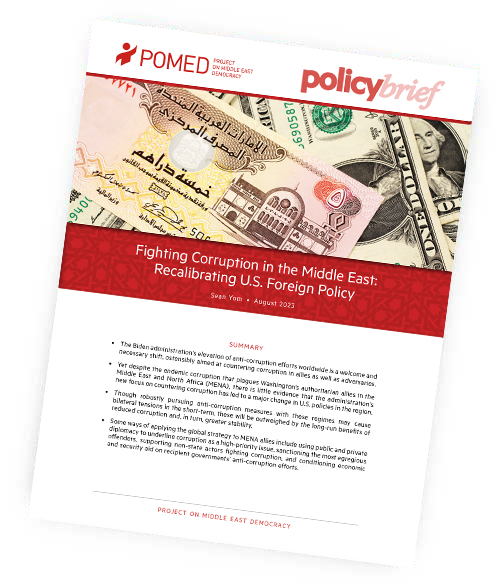 The Biden administration’s elevation of anti-corruption efforts worldwide is a welcome and necessary shift, ostensibly aimed at countering corruption in allies as well as adversaries.
The Biden administration’s elevation of anti-corruption efforts worldwide is a welcome and necessary shift, ostensibly aimed at countering corruption in allies as well as adversaries. - Yet despite the endemic corruption that plagues Washington’s authoritarian allies in the Middle East and North Africa (MENA), there is little evidence that the administration’s new focus on countering corruption has led to a major change in U.S. policies in the region.
- Though robustly pursuing anti-corruption measures with these regimes may cause bilateral tensions in the short-term, these will be outweighed by the long-run benefits of reduced corruption and, in turn, greater stability.
- Some ways of applying the global strategy to MENA allies include using public and private diplomacy to underline corruption as a high-priority issue, sanctioning the most egregious offenders, supporting non-state actors fighting corruption, and conditioning economic and security aid on recipient governments’ anti-corruption efforts.
INTRODUCTION
The Biden administration has initiated a potential sea change in U.S. foreign policy by explicitly defining the fight against corruption as a core national security interest for the first time. In the past, the United States tended to view corruption abroad primarily as an economic problem, one that impoverished other countries but fell below other U.S. diplomatic and security considerations. Now, with the release of the June 2021 National Security Study Memorandum on corruption, the launch of a Strategy on Countering Corruption six months later, and progress on the strategy announced at the second Summit for Democracy in March 2023, the Biden administration has declared corrupt practices abroad to be a clear threat to key U.S. interests.[1] As President Joe Biden put it in the memorandum, corruption threatens “democracy itself.”[2]
Critically, the Biden administration’s anti-corruption agenda is, in principle, not limited to global rivals such as China and Russia; it instead anoints corruption as so common but also so grave that it must be addressed everywhere. How this applies to U.S. engagement in the Middle East and North Africa (MENA), though, raises vexing questions. It is relatively easy politically for the U.S. government to sanction Iranian firms or Syrian officials for corruption: They represent adversarial regimes. Yet what of taking action with authoritarian “allies” in the region?
Washington’s authoritarian MENA allies all suffer from endemic corruption, a consequence of their autocratic power structures, economic cronyism, and administrative opacity. But rather than tackle thorny but crucial issues of corruption, successive U.S. administrations have favored continued diplomatic support, economic aid, and military assistance in a misguided effort to shore up these regimes. And despite the high-profile and robust new U.S. Strategy on Countering Corruption, there is little sign that the issue is playing a significant role in U.S. policy in this region today.
Yet continuing to downplay corruption is making MENA countries less, not more, stable, as evidenced by the many uprisings, sparked in part by public anger over corruption, that have roiled the region since late 2010. Though robustly pursuing anti-corruption efforts may cause bilateral tensions in the short-term, these will be outweighed by the long-run benefits of reduced corruption and, in turn, greater stability.
This Policy Brief describes the extent and destabilizing effects of corruption in MENA, discusses key aspects of the Biden administration’s global anti-corruption strategy, and offers recommendations for how the U.S. government can apply that strategy in its MENA policies.
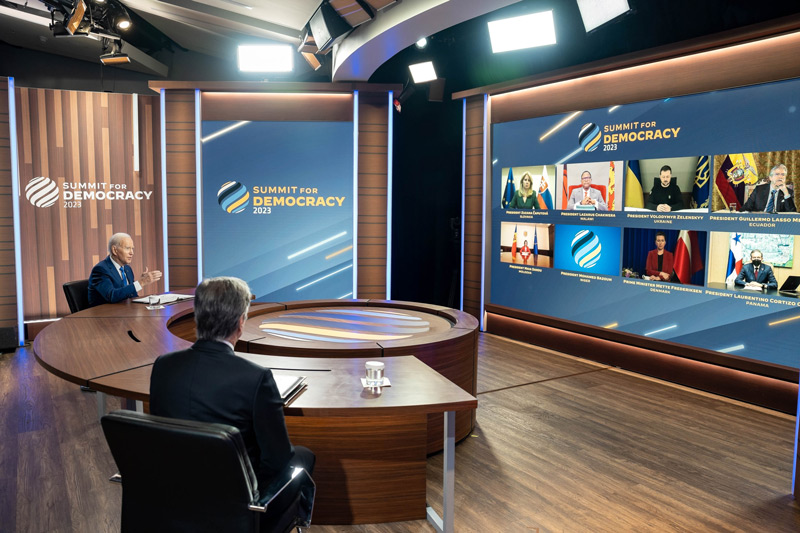
President Joe Biden delivers remarks at the second Summit for Democracy on March 29, 2023, the same day the White House announced its progress in implementing the United States Strategy on Countering Corruption. Photo: White House/Flickr
UNDERSTANDING CORRUPTION IN MENA
Corruption, broadly, means the abuse of entrusted power for personal or political gain. This covers a wide range of improprieties committed by those entrusted with public authority, from bribery and nepotism to fraud, embezzlement, and graft. Corruption ranges from administrative or petty corruption, involving low-level misconduct that shapes everyday life, to grand corruption, which entails high-level abuses of power committed by rulers and powerful regime-connected elites.
At the everyday level, the use of personal connections (in Arabic, wasta) to grease the wheels of public transactions, such as obtaining healthcare or university admission, is often an inescapable requirement of not just upward mobility but daily survival.[3] Complicating such petty corruption are social divides—such as tribalism, sectarianism, and religion—that often dictate how favors are granted or demands are made.
As one ascends the ladders of the state, acts of administrative corruption touch increasingly influential figures. For example, an Egyptian bureaucrat may ensure that less-qualified cronies are promoted instead of meritorious candidates. A Jordanian civil servant might accept private favors in return for expediting lengthy paperwork. A Kuwaiti parliamentarian could pocket a royal bribe to support a controversial bill. A Tunisian judge might accept benefits to look the other way as political figures break the laws. A Moroccan minister may collude with businesspeople to secure mutually enriching contracts without fair competition. Since neoliberal economic reforms swept across the region in the 1990s, crony capitalism—that is, when success in business depends on favoritism from the government—has escalated across the board as profitable opportunities like privatization and market investments have emerged.[4]
At the apex of the state, leaders, their family members, and senior officials have been implicated in grand corruption, typically through large-scale kickbacks and industrial-scale embezzlement and graft. The 2011–12 Arab Spring and the follow-up 2018–19 protests, motivated in large part by citizen anger over ruling classes’ corruption, helped topple kleptocratic presidents in 2011 in Egypt, Tunisia, Yemen, and Libya, followed by Sudan and Algeria in 2019. Lebanon and Iraq have also witnessed major corruption-inspired protests in recent years. Yet grand corruption persists across the region, in countries that experienced changes of power and elsewhere. Corruption in both the Palestinian Authority and Hamas, for instance, reaches into the heart of their leaderships.[5] In the Gulf countries, oil wealth has long fueled the opaque ecosystem of royal corruption that has made ruling families and their cronies lavishly rich. Emirati leaders allow foreign kleptocrats to use Dubai as a major money-laundering hub.[6] Elsewhere, corruption scandals have ensnared King Abdullah II of Jordan, King Mohammed VI of Morocco, and Israeli Prime Minister Benjamin Netanyahu.[7] The Assads of Syria, the clerical elites of Iran, the military rulers of Egypt, and the rotating governments of Iraq and Lebanon have also profited richly from corruption.[8]
That administrative and grand corruption have become endemic in the region is well known. Transparency International’s Corruption Perceptions Index ranks most Arab states poorly: The regional average score is now 39 out of 100 (with 100 being the least corrupt), and no MENA country has registered a significant improvement over the past decade.[9] Arab publics, too, are well aware of the problem. The Arab Barometer’s 2021 poll showed that very high majorities believed corruption existed to a moderate or large extent in their respective countries—for instance, 87 percent in Algeria, 85 percent in Jordan, 92 percent in Iraq, 89 percent in Lebanon, and 92 percent in Tunisia.[10]
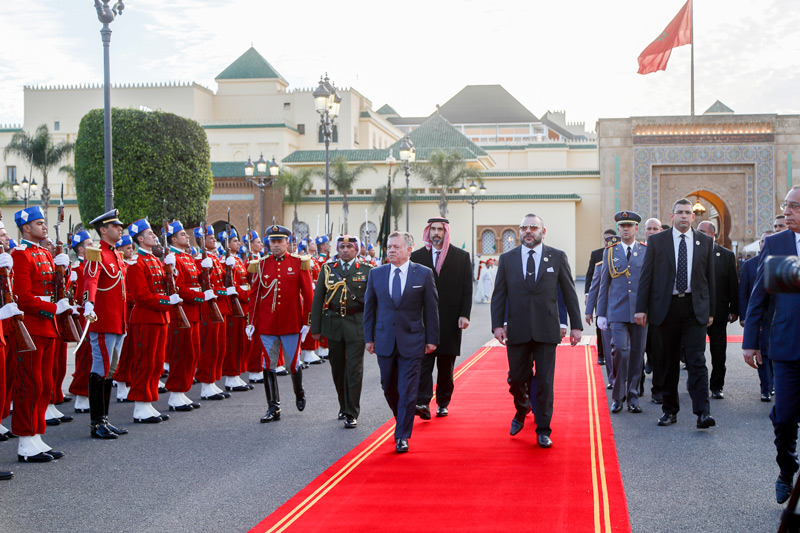
King Abdullah II of Jordan (left) and King Mohammed VI of Morocco (right), shown above in Rabat, Morocco, on March 22, 2017, have both been implicated in corruption scandals. Photo: Royal Hashemite Court Archives
CORRUPTION’S DESTABILIZING EFFECTS IN MENA
Corruption exerts extremely destructive effects on both economic and political development. In the short term, it impedes good governance by distorting the distribution of public resources and amplifying the privileges held by corrupt insiders.[11] Over the longer term, corruption erodes government responsiveness to public needs, weakens economic growth, and drives political conflict.[12] It does so by destroying public trust, fueling popular discontent, weakening bureaucratic capacity, and empowering powerful elites to repress those who threaten to expose their crimes.
The economic costs of the region’s rampant corruption are considerable. The Arab Forum for Environment and Development, a Beirut-based NGO, estimates that the Arab world loses $100 billion every year to corrupt practices.[13] Accurate country-level data are elusive, but the case of Iraq is illustrative. According to its own Parliamentary Transparency Commission, the country has lost more than $320 billion to corruption since 2003.[14] Corruption has also played a major role in driving Lebanon’s ongoing economic crisis, which the World Bank has described as one of the worst globally since the mid-19th century.[15]
Especially in contexts of high unemployment and severe economic inequality, corruption infuriates citizenries because it makes a mockery of fairness and justice, demonstrating that a privileged few can get wealthy through illegal means and with impunity. Indeed, the prominence of corruption as a grievance in so many MENA protests over the past decade vividly illustrates how anger over corruption can trigger unrest.
Nor does corruption respect national boundaries. Corrupt rulers responsible for human rights abuses at home stash their riches abroad and contribute to unethical and criminal activity elsewhere—including in the United States.[16] Corrupt officials and criminal networks launder money to fund armed groups involved in regional conflicts, prolonging violence and exacerbating instability within and across national borders. In addition, corrupt actors exploit weak regulatory frameworks to channel illicit funds of terrorist networks that then recruit, train, and carry out attacks.[17]
The United Arab Emirates offers a compelling case in point. Its role as a hub for illicit finance enables the destabilizing behavior of Iran’s Islamic Revolutionary Guard Corps, allows Russian oligarchs to evade sanctions over the war in Ukraine, and can even fuel terrorist financing, as recognized by the intergovernmental Financial Action Task Force’s decision to place the country on its “grey list” in 2022.[18]
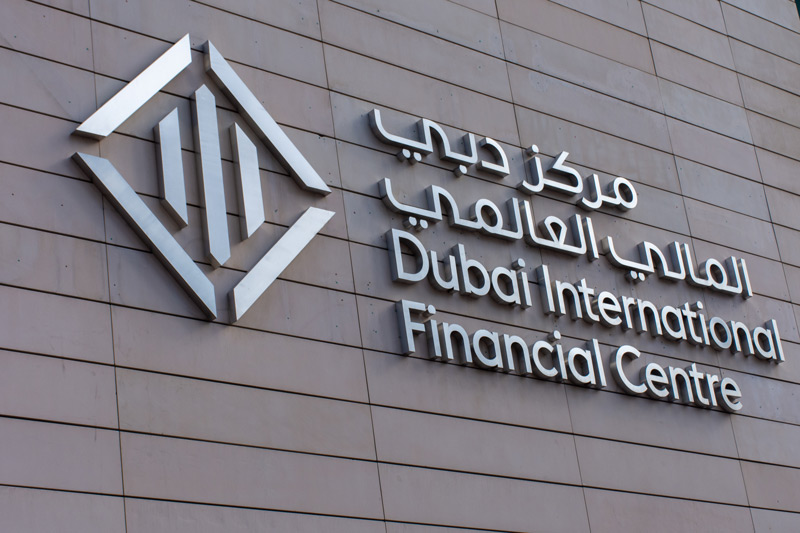
Dubai is a global financial center, with the Dubai International Financial Centre, shown above in an undated photo, the top financial hub in the region, but also a major haven for money-laundering and other illicit financial flows. Photo: Adobe Stock Images
THE PERSISTENCE OF MENA CORRUPTION
There are three main reasons why corruption is so persistent in the region.
First, corruption goes hand in hand with authoritarianism, which remains the predominant form of rule in MENA. Autocratic regimes nurture the ideal conditions for corruption: weak rule of law, muffled media, bloated bureaucracies, extreme inequality, and clientelistic rulerships that trade patronage for loyalty. Corruption has flourished in the absence of transparency and accountability, and domestic repression has helped squelch many reports of corruption as well as public dissent. In Jordan, for instance, when the Pandora Papers revealed King Abdullah’s $100 million Western real estate empire in October 2021, the entire national press was forbidden from mentioning the story.[19] In September 2019, Egyptian authorities arrested hundreds of people following rare anti-government protests triggered by reports of major corruption by the military regime.[20] Democracies, by contrast, make it harder (though not impossible) for corrupt practices to transpire because they feature stronger legal institutions, more independent media, and constitutional safeguards that constrain the exploitation of power by public officeholders.[21]
A second reason is that MENA governments have chosen not to seriously crack down on corruption, despite frequent promises to do so. On one end of the spectrum are cases of relative inaction on corruption, like in Tunisia. Here, the post-revolutionary democracy that coalesced after 2011 did little to punish corrupt acts committed under the dictatorship or to limit new acts of corruption that flourished during the transition process. Widespread public anger over this failure, and President Kaïs Saïed’s promises to tackle graft and punish corrupt politicians, facilitated Saïed’s July 2021 power grab. (Ironically, just one month later, he dismantled the National Anti-Corruption Authority established in the wake of the revolution.[22])
Other Arab governments have promulgated anti-corruption measures, but they have weaponized these efforts—targeting rivals and those who speak up about government corruption but leaving leaders and their families untouched. In the most extreme cases, Saudi Crown Prince Mohammed bin Salman’s and Iraqi Prime Minister Mustafa al-Kadhimi’s violent anti-corruption purges in 2017 and 2020, respectively, left trails of torture and arbitrary imprisonment as the leaders narrowly pursued perceived elite competitors.
Another example of such politicized efforts lies in anti-corruption agencies (ACAs), present in at least 10 MENA states.[23] ACAs are government institutions endowed with judicial authority to investigate public corruption.[24] In practice, however, these agencies do not operate independently of executive power. Rather than rooting out public corruption, they mainly serve to regulate it by keeping corrupt networks flowing for the benefit of leaders while punishing those who fall out of line.[25]
In Jordan, for example, the Integrity and Anti-Corruption Commission is legally subordinate to the monarchy and its royally appointed government, and it is therefore severely limited in its ability to investigate the monarchy, military, police, or intelligence directorate. It also has no independent authority to prosecute offenders, instead having to refer cases to the judiciary; successful prosecutions of high-ranking officials remain rare.[26] Similarly, the Administrative Control Authority in Egypt does investigate some officials in the civilian state bureaucracy, but it is under the direct control of President Abdel Fattah al-Sisi, and its mandate excludes the military and its vast economic role.[27]
Third, Arab regimes have traditionally faced little external pressure to tackle corruption. U.S. geopolitical calculations in MENA have focused on preserving short-term regime stability; reports about internal corruption are often ignored or downplayed in order to preserve relations with rulers. European governments have largely followed suit in avoiding the issue. While occasional U.S. Agency for International Development (USAID) programs have touched on anti-corruption themes, in general this highly sensitive issue has been a low priority for successive U.S. administrations when stacked against the overarching imperative of preserving strong ties with regimes.
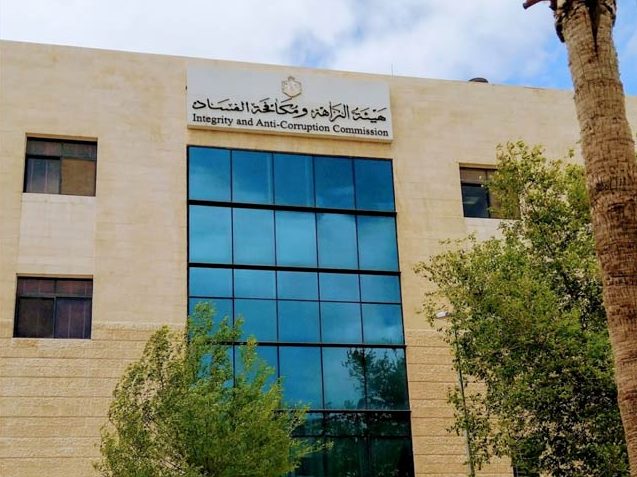
Jordan’s Integrity and Anti-Corruption Commission, shown above in a photo from April 2019, is legally subordinate to the monarchy and its royally appointed government and has no independent prosecutorial authority. Photo: Ali Ali/Google Maps
BIDEN’S COUNTERING CORRUPTION STRATEGY
The Biden administration’s anti-corruption strategy could, if implemented, help to change this regional state of affairs. Unveiled by the White House in December 2021 and elaborated in subsequent policy statements, the new policy, on paper, sharply breaks from past U.S. efforts in at least two regards.[28] First, the administration has designated the fight against corruption as a cross-sectoral priority, meaning that anti-corruption efforts should be embedded in the administration’s overall foreign policy, including diplomacy and foreign assistance, and across sectors as diverse as health, education, democracy, economic development, and international law enforcement. The strategy promises a “comprehensive, coordinated global effort . . . to go law by law, loophole by loophole, launderer by launderer.”[29] The U.S. government had never before put forward such a wide-reaching, systematic approach. The strategy implies that successful anti-corruption efforts will be led by the White House, integrated into all aspects of U.S. foreign (and parts of domestic) policy, and sustained as a long-term priority.
Second, and perhaps more important, the Biden administration has elevated combating corruption to a U.S. national security interest.[30] The policy rightly presents corruption as not only a barrier to economic development—the traditional view of international development agencies—but as a broader phenomenon affecting security, human rights, stability, and democracy. The MENA region is an ideal foil for this new orientation. There, untrammeled corruption not only strengthens authoritarianism and contributes to human rights abuses, but it also feeds public discontent that can weaken security and destabilize countries, thereby threatening important U.S. interests. By grasping this connection, the new agenda elevates corruption to a high priority issue that must shape the tenor of U.S. relationships with even its closest allies.
ENDING THE MENA EXCEPTION
Yet despite the strategy’s promises, there is no evidence that the Biden administration has made anti-corruption programming a top-level issue for its MENA partners so far.
For example, one anti-corruption tool the administration utilizes globally is targeted sanctions against people and organizations that are connected to major financial and political misdeeds. When it comes to MENA, the administration has applied this tool against Iranian, Syrian, and Yemeni Houthi individuals and groups—all U.S. adversaries—as well as in its quasi-partner Lebanon. There, the Biden administration has imposed corruption sanctions not only against Hezbollah-related networks, as expected, but also against several prominent politicians and businesspersons affiliated with other parties, as well as Riad Salameh, the former governor of Lebanon’s central bank.[31] But Lebanon is a special case: As one former U.S. official explained, such actions are perceived to carry less risk to U.S. interests because Lebanon’s coalition government is weaker than personalist partner regimes such as those of Egypt or Saudi Arabia.[32] The administration has notably declined to apply corruption sanctions against high-ranking political and business figures tied to any other “friendly” MENA regimes.
Apart from sanctions, other potential anti-corruption tools have also gone unused with regional allies. The administration has not, for instance, conditioned the provision of aid on recipient governments’ progress in tackling corruption. Nor has it delayed or stopped any arms transfer or sale to a MENA government on account of corruption concerns, even as such arms deals themselves sometimes reinforce corruption in recipient governments via kickbacks and offsets.[33]
As for USAID, reducing corruption across the region as part of a coherent global campaign would represent an enormous shift from the agency’s past anti-corruption efforts, which over the past decade have been modest in scope, fragmented across programs, and undermined by larger imperatives of maintaining smooth relations with authoritarian allies. Since the strategy’s release, some work has been done: USAID has crafted new policy frameworks that mirror its holistic understanding of corruption as a systemic problem, and it is still conceiving of ways to implement the strategy into its many missions across the region.[34] As the Biden administration formulates new, integrated mechanisms for policy delivery in MENA, however, it should take note that its early results in applying its new anti-corruption focus have been inconsistent.
Perhaps most visibly, the strategy promises that the United States will “elevate anti-corruption efforts through bilateral and multilateral diplomatic engagements,” but thus far, this has not led to a discernible change in the administration’s public messaging or private diplomacy in the region. National Security Advisor Jake Sullivan’s May 2023 major speech at The Washington Institute for Near East Policy on U.S. priorities in the Middle East, for example, made no mention of corruption.[35] Readouts of President Biden’s or Secretary of State Antony Blinken’s phone calls and meetings with Arab leaders and senior officials have also shirked the issue.[36]
Like previous administrations, the Biden team likely worries that pushing authoritarian MENA allies too hard on this sensitive issue would unduly complicate bilateral relations—thereby endangering cooperation on longstanding U.S. priorities such as protecting energy security, fighting terrorism, or containing Iran—or perhaps even undermine rulers. These concerns, while real, are short-sighted: It is unchecked corruption, not the effort to combat it, that ultimately imperils stability. The Arab Spring and its 2018–19 aftershocks corroborate that while unbridled corruption can enrich an autocracy, it can also plant the seeds of its sudden (and violent) demise. Popular anger over public corruption in American partner states like Morocco, Egypt, Jordan, and Saudi Arabia remains high. In the medium and long run, there is no dichotomy between corruption versus stability; the former endangers the latter.
The pathway forward, thus, cannot be business as usual. Reducing corruption can advance democracy and human rights by emphasizing accountable, transparent governance. It also aligns with wider geopolitical concerns by improving the prospects of long-term stability in the region—the ultimate U.S. interest.
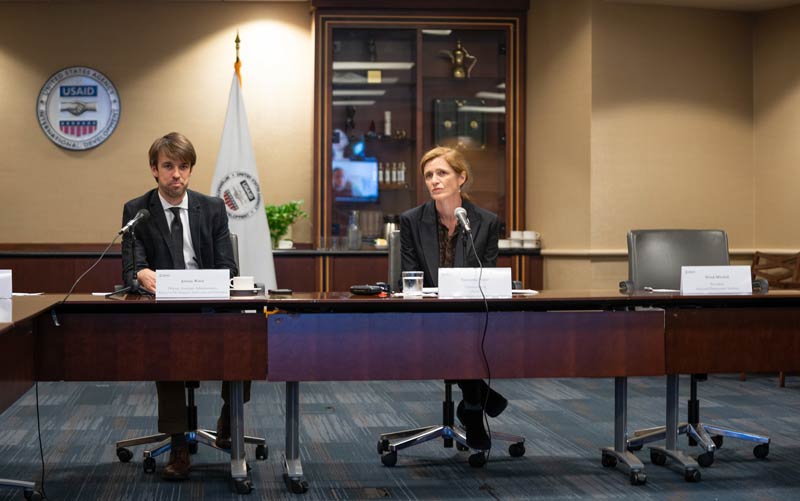
U.S. Agency for International Development Administrator Ambassador Samantha Power (right) meets with leaders of democracy and anti-corruption organizations on August 11, 2022, to discuss support for democracy and countering authoritarianism. Photo: USAID/Flickr
POMED POLICY RECOMMENDATIONS
There are numerous tools in the U.S. Strategy on Countering Corruption and deliverables from the two Summits for Democracy from which the United States can draw to pursue a stronger anti-corruption policy in MENA. The global framework laid out by the Biden administration is sound and indeed commendable; the question is whether the administration has the political will to enact it robustly across MENA. Below are nine commitments from the strategy that the U.S. government should apply in the region, as well as concrete ways it can do so:
1.
Commitment from the U.S. Strategy on Countering Corruption: “The United States will elevate anti-corruption as a priority within its diplomatic and public diplomacy efforts in a manner tailored to local conditions.”
— Strategic Objective 5.1
Recommendation: Use public and private diplomacy to underline corruption as a high-priority issue in MENA.
Multiple, overlapping points of U.S. engagement—from ambassadors and embassy staff stationed in-country to senior officials in Washington—should communicate to MENA governments and publics that the United States expects serious efforts to reduce corruption and will offer support for such efforts. The message must be unambiguous: Washington’s commitment to fight corruption is a long-term goal rather than a passing fad, and it is part of a broader U.S. policy to advance prosperity and stability in MENA.
2.
“We will innovate, adapt, partner, and learn, so as to maximize the potential for diplomatic tools, including . . . targeted sanctions, to stem corruption and to hold corrupt actors accountable.”
— Our Approach, Pillar 3
Broaden anti-corruption sanctions to target the most egregious offenders, regardless of nationality.
As Secretary Blinken has stated, U.S. anti-corruption sanctions, including under the Global Magnitsky Act, are a powerful tool to “disrupt illicit activity and networks, promote accountability, and impose costs for egregious behavior.”[37] Applying corruption sanctions more broadly in MENA would send an unmistakable signal to governments about Washington’s seriousness. Sanctioning powerful elites, as well as the institutions that enable them, is also key to breaking up corruption networks that cross borders.
3.
“The United States will increase its focus on the transnational aspects of corruption, including kleptocracy and the use of corruption by state actors and their proxies.”
— Strategic Objective 1.3
Curb transnational corruption through anti-kleptocratic measures.
The United States should employ the expanded law enforcement tools described in the Strategy on Countering Corruption’s third pillar, “Holding Corrupt Actors Accountable,” to, for instance, more closely monitor illicit financial flows originating in or flowing through MENA that enter the American banking system or are used to purchase U.S. assets, such as real estate and art.
4.
“We will . . . redouble our efforts in multilateral fora to push for anticorruption measures, advocate for strong corruption controls in any multilateral assistance, and expand and enhance our engagement in key venues.”
— Our Approach, Strategic Objective 4.2
Work through multilateral institutions and fora to encourage MENA states to strengthen their anti-corruption laws and policies.
Corruption, as a global and transnational phenomenon, requires international cooperation to prevent and combat it. The United Nations Convention Against Corruption (UNCAC)—the only legally binding international covenant against corruption—is an appropriate place to start. All MENA countries except Syria are parties to the UNCAC; indeed, Egypt hosted the biennial meeting of UNCAC’s main policy-making body in December 2021. The United States, which is hosting the group for the first time in December 2023, can utilize this venue to nudge MENA governments to follow through with treaty obligations, such as adopting common standards for informational transparency, whistleblower protections, and banking safeguards against illicit financing.[38] Further, the United States is the founder of the Open Government Partnership (OGP), wherein member governments work with civil society to create and implement National Action Plans (NAPs) around anti-corruption and good governance measures. As it rejoins the OGP’s steering committee this year, the United States should revitalize its participation by engaging members such as Tunisia and Morocco to ensure NAPs are implemented effectively. NAP implementation can also be bolstered and incentivized by complementary USAID anti-corruption foreign assistance programs.
5.
“The United States will pursue a substantial expansion in anticorruption focused U.S. assistance, and will monitor the efficacy of this assistance, including through external evaluations.”
— Strategic Objective 5.1
Make countering corruption a more robust (and measurable) part of U.S. foreign assistance to MENA.
In addition to dedicating more resources to anti corruption-related programs, USAID and the Millennium Challenge Corporation should create public benchmarks for such assistance. Anti-corruption programs should forecast the fruits of their projected success, such as the economic resources to be recovered, the political bribery to be reduced, or the illicit networks to be shut down. This would make corruption-fighting efforts more public and transparent to local societies, helping to win their trust while also holding the United States accountable to its own stated goals.
6.
“Criteria for government-to-government assistance: The United States will consistently apply criteria across countries specifically related to transparency, accountability, and anti-corruption, including around the protection of journalists and whistleblowers.”
— Strategic Objective 5.4
Condition economic and security aid on recipient countries making genuine progress on tackling corruption.
The United States should incentivize MENA governments to undertake anti-corruption efforts by conditioning the provision of U.S. foreign assistance on the performance of such efforts, measured with clear benchmarks.
7.
“[F]oreign assistance can be diverted or inadvertently reinforce corrupt power structures. To safeguard its assistance dollars, the U.S. Government must therefore assess the absorptive capacity of prospective partners, rationalize investments across the interagency, operate its programming with the utmost transparency, and ensure that its assistance efforts fully align with broader policy goals.”
— Strategic Pillars, Pillar 5
Review U.S. foreign assistance to ensure that it does not contribute to corrupt practices.
USAID has been an early leader in this regard, with its forthcoming Reference Guide on Operational Safeguards one effort intended to ensure that the agency’s programming counters, rather than facilitates, corruption. Other agencies, including the Departments of State and Defense and the MCC, should follow suit. Arms sales and defense contracts represent one easy starting point, given mounting evidence of their connection to corruption in recipient countries.
8.
“The United States will boost its ongoing efforts to support, defend, and protect investigative journalists and other civil society and media actors on the front lines of the fight against corruption.”
— Strategic Objective 3.5
Support non-state actors fighting corruption.
Activists, journalists, and NGOs seeking to expose corruption and hold governments accountable in MENA countries face formidable obstacles and dangers, including imprisonment. The Biden administration should employ new tools like USAID’s Empowering Anti-Corruption Change Agents Program and Reporters Shield to support such anti-corruption actors and to protect them from state repression. It should provide funding or technical support to journalists and activists bravely working on corruption, and U.S. officials should meet with them to show support for their work. The administration should also press governments to release journalists, civic activists, officials, and others being unjustly imprisoned for their anti-corruption activity.
9.
“Although the international financial institutions (IFIs) and multilateral trust funds include safeguards on their own financial assistance, the United States, along with other donor countries, will continue to work and engage with these entities to align and strengthen anti-corruption guardrails and to enhance, when needed, oversight over procurement and overall use of funds.”
— Strategic Objective 4.2
Work with international financial institutions (IFIs) to strengthen transparency and oversight of their assistance to MENA governments and to include anti-corruption benchmarks in their lending.
The United States, as the largest shareholder in the International Monetary Fund and the World Bank, has an influential voice in these institutions. The Biden administration should press for benchmarks related to transparency and accountability in these IFIs’ loans to Egypt, Jordan, and other countries in the region, which in many cases far exceeds U.S. bilateral aid, as well as advocating for greater attention on anti-corruption efforts in IFI programming.
NOTES
1. The White House, “Memorandum on Establishing the Fight Against Corruption as a Core United States National Security Interest,” June 3, 2021, https://www.whitehouse.gov/briefing-room/presidential-actions/2021/06/03/memorandum-on-establishing-the-fight-against-corruption-as-a-core-united-states-national-security-interest/; The White House, “United States Strategy on Countering Corruption,” December 2021, http://www.whitehouse.gov/wp-content/uploads/2021/12/United-States-Strategy-on-Countering-Corruption.pdf; The White House, “FACT SHEET: Implementing the United States Strategy on Countering Corruption: Accomplishments and Renewed Commitment in the Year of Action,” March 29, 2023, https://www.whitehouse.gov/briefing-room/statements-releases/2023/03/29/fact-sheet-implementing-the-united-states-strategy-on-countering-corruption-accomplishments-and-renewed-commitment-in-the-year-of-action/
2. White House, “Memorandum on Establishing the Fight Against Corruption.”
3. Robert Cunningham and Yasin Sarayrah, Wasta: The Hidden Force in Middle Eastern Society (Boulder: Praeger, 1993).
4. Ishac Diwan, Adeel Malik, and Izak Atiyas, eds., Crony Capitalism in the Middle East: Business and Politics from Liberalization to the Arab Spring (Oxford: Oxford University Press, 2019).
5. Qassam Muaddi, “Corruption is the main concern for Palestinians, says local anti-corruption watchdog,” New Arab, March 30, 2022, https://www.newarab.com/news/corruption-leading-concern-palestinians-says-watchdog
6. Matthew T. Page and Jodi Vittori, “Dubai’s Role in Facilitating Corruption and Global Illicit Financial Flows,” Carnegie Endowment for International Peace, July 7, 2020, https://carnegieendowment.org/2020/07/07/dubai-s-role-in-facilitating-corruption-and-global-illicit-financial-flows-pub-82180
7. Greg Miller, “While his country struggles, Jordan’s King Abdullah secretly splurges,” Washington Post, October 3, 2021, https://www.washingtonpost.com/world/interactive/2021/jordan-abdullah-shell-companies-luxury-homes/; Sarah-Taïssir Bencharif, “EU Parliament scandal: The Morocco connection,” Politico, December 16, 2022, https://www.politico.eu/article/qatargate-antonio-panzeri-francesco-giogrio-eu-parliament-scandal-the-morocco-connection/; Norman Eisen, Mansi Patel, and Kai Smith, “The corruption and autocracy nexus: The case of ‘King Bibi,’” Brookings Institution, April 10, 2023, https://www.brookings.edu/articles/the-corruption-and-autocracy-nexus-the-case-of-king-bibi/
8. Tom Allinson, “How Assad’s family and others filled their European coffers,” Deutsche Welle, April 29, 2020, https://www.dw.com/en/stealth-wealth-how-assads-family-and-others-have-filled-their-european-coffers/a-53271132
9. Transparency International, “CPI 2021 for Middle East & North Africa: Systemic Corruption Endangers Democracy and Human Rights,” January 25, 2022, https://www.transparency.org/en/news/cpi-2021-middle-east-north-africa-systemic-corruption-endangers-democracy-human-rights
10. Arab Barometer, Arab Barometer VI, accessed August 8, 2023, https://www.arabbarometer.org/surveys/covid-19-survey/
11. Eugen Dimant and Guglielmo Tosato, “Causes and Effects of Corruption: What Has Past Decade’s Empirical Research Taught Us? A Survey,” Journal of Economic Surveys 32 (2018): 335-356.
12. Michael Johnston, Syndromes of Corruption: Wealth, Power, and Democracy (New York: Cambridge University Press, 2006).
13. Najib Saab and Abdul-Karim Sadik, Financing Sustainable Development in Arab Countries (Beirut: AFED, 2018), 13.
14. Louisa Loveluck and Mustafa Salim, “A U.S. Ally in Iraq Vowed to Tackle Corruption. Torture and Extortion Followed,” Washington Post, December 21, 2022, https://www.washingtonpost.com/world/2022/12/21/iraq-kadhimi-corruption-committee-torture/
15. Guilherme France, “Lebanon: Overview of corruption and anti-corruption,” U4 Anti-Corruption Resource Centre, September 8, 2022, https://www.u4.no/publications/lebanon-overview-of-corruption-and-anti-corruption
16. Alexander Cooley, John Heathershaw, and J.C. Sharman, “The Rise of Kleptocracy: Laundering Cash, Whitewashing Reputations,” Journal of Democracy 29 (2018): 39-53.
17. Roberto Martínez B. Kukutschka, “CPI 2022: Corruption as a Fundamental Threat to Peace and Security,” Transparency International, January 31, 2023, https://www.transparency.org/en/news/cpi-2022-corruption-fundamental-threat-peace-security
18. Page and Vittori, Dubai’s Role in Facilitating Corruption; Matthew Karnitschnig, “West wants to look the other way on UAE money laundering,” Politico, June 21, 2023, https://www.politico.eu/article/united-arab-emirates-eu-france-ergmany-uswest-wants-to-look-the-other-way-on-uae-money-laundering/
19. Simon Goodley and Michael Safi, “King of Jordan hidden property empire worth more than $100m, Pandora papers reveal,” Guardian, October 3, 2021, https://www.theguardian.com/news/2021/oct/03/king-of-jordan-hidden-property-empire-worth-more-than-100m-pandora-papers-reveal; Mohammad Ersan, “Pandora Papers: In Jordan, King Abdullah leaks are met with media blackout,” Middle East Eye, October 4, 2021, https://www.middleeasteye.net/news/pandora-papers-jordan-king-abdullah-leaks-media-blackout
20. “Several hundred arrests amid protest calls in Egypt – rights group,” Reuters, September 28, 2020, https://www.reuters.com/article/egypt-politics-int-idUSKBN26J2R9
21. Daniel Treisman, “What Have We Learned About the Causes of Corruption from Ten Years of Cross-National Empirical Research?” Annual Review of Political Science 10 (2007): 211-244.
22. “Tunisia: Authorities close Anti-Corruption Authority headquarters after evicting employees,” Middle East Monitor, August 21, 2021, https://www.middleeastmonitor.com/20210821-tunisia-authorities-close-anti-corruption-authority-headquarters-after-evicting-employees/
23. Algeria, Egypt, Jordan, Kuwait, Morocco, Palestine, Qatar, Saudi Arabia, Tunisia, and the United Arab Emirates all have ACAs.
24. Luís de Sousa, “Anti-Corruption Agencies: Between Empowerment and Irrelevance,” Crime, Law, and Social Change 53 (2010): 5-22.
25. Jessica Noll, “Report – Fighting Corruption or Protecting the Regime? Egypt’s Administrative Control Authority,” POMED, February 6, 2019, https://mideastdc.org/publication/report-fighting-corruption-or-protecting-the-regime-egypts-administrative-control-authority/
26. Freedom House, “Freedom in the World 2023: Jordan,” accessed August 8, 2023, https://freedomhouse.org/country/jordan/freedom-world/2023
27. Noll, “Fighting Corruption or Protecting the Regime?”
28. The White House, “United States Strategy on Countering Corruption.”
29. The White House, “Remarks by National Security Advisor Jake Sullivan at the International Anti-Corruption Conference (IACC),” White House, 6 December 2022, https://www.whitehouse.gov/briefing-room/speeches-remarks/2022/12/06/remarks-by-national-security-advisor-jake-sullivan-at-the-international-anti-corruption-conference-iacc/
30. “Fact Sheet: U.S. Strategy on Countering Corruption,” White House Press Release, June 3, 2021, https://www.whitehouse.gov/briefing-room/statements-releases/2021/12/06/fact-sheet-u-s-strategy-on-countering-corruption/
31. “US sanctions targeting corruption span across Lebanese political parties,” LBCI, April 5, 2023, https://www.lbcgroup.tv/news/news-bulletin-reports/695903/us-sanctions-targeting-corruption-span-across-leba/en; Matthew Miller, Joint U.S., U.K. and Canadian Sanctions Against Former Lebanese Official and Co-Conspirators in Corruption Scheme, U.S. Department of State press release, August 10, 2023, https://www.state.gov/joint-u-s-uk-and-canadian-sanctions-against-former-lebanese-official-and-co-conspirators-in-corruption-scheme/
32. As explained to POMED by a former senior State Department official, July 2023.
33. Jodi Vittori, “Mitigating Patronage and Personal Enrichment in U.S. Arms Sales,” Carnegie Endowment for International Peace, May 18, 2021, https://carnegieendowment.org/2021/05/18/mitigating-patronage-and-personal-enrichment-in-u.s.-arms-sales-pub-84526
34. Phyllis Dininio, Anti-Corruption Mapping and Analysis: Governance Integration for Stabilization and Resilience in the Middle East and North Africa (GISR MENA), Management Systems International, January 7, 2022, https://pdf.usaid.gov/pdf_docs/PA00ZJ1K.pdf; “USAID Guide to Countering Corruption Across Sectors,” USAID Anti-Corruption Task Force, September 27, 2022, https://www.usaid.gov/documents/usaid-guide-countering-corruption-across-sectors
35. Jake Sullivan, “Keynote Address by National Security Advisor Jake Sullivan,” Washington Institute for Near East Policy, May 4, 2023, https://www.washingtoninstitute.org/policy-analysis/keynote-address-national-security-advisor-jake-sullivan
36. Iraq is an exception, as administration officials have consistently raised corruption concerns in meetings with Iraqi leaders. See, for example, U.S. Embassy & Consulate in Iraq, “Secretary Blinken’s Meeting with Iraqi Prime Minister al-Sudani,” February 18, 2023, https://iq.usembassy.gov/secretary-blinkens-meeting-with-iraqi-prime-minister-al-sudani/
37. Antony J. Blinken, “Combating Global Corruption and Human Rights Abuses,” U.S. Department of State, December 9, 2022, https://www.state.gov/combatting-global-corruption-and-human-rights-abuses/
38. U.S. Department of State, “United States will Host the 10th Conference of the States Parties to the UN Convention Against Corruption in Atlanta, Georgia,” January 10, 2023, https://www.state.gov/united-states-will-host-the-10th-conference-of-the-states-parties-to-the-un-convention-against-corruption-in-atlanta-georgia/

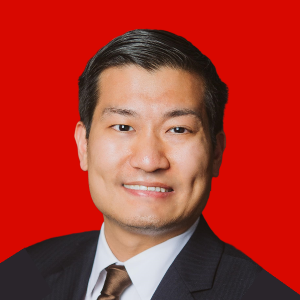
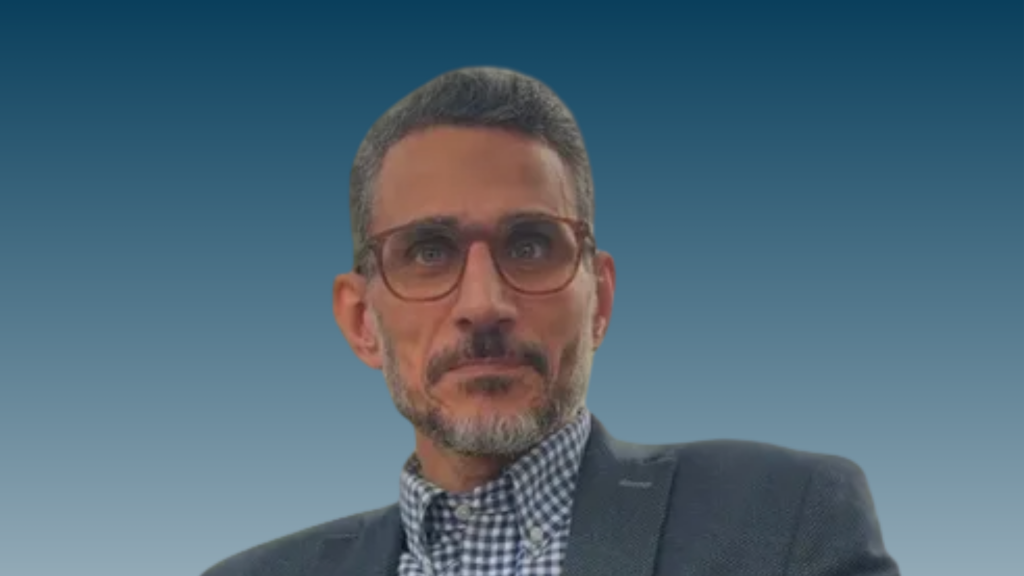

|
President Trump is Undermining Foreign Aid Transparency and Accountability